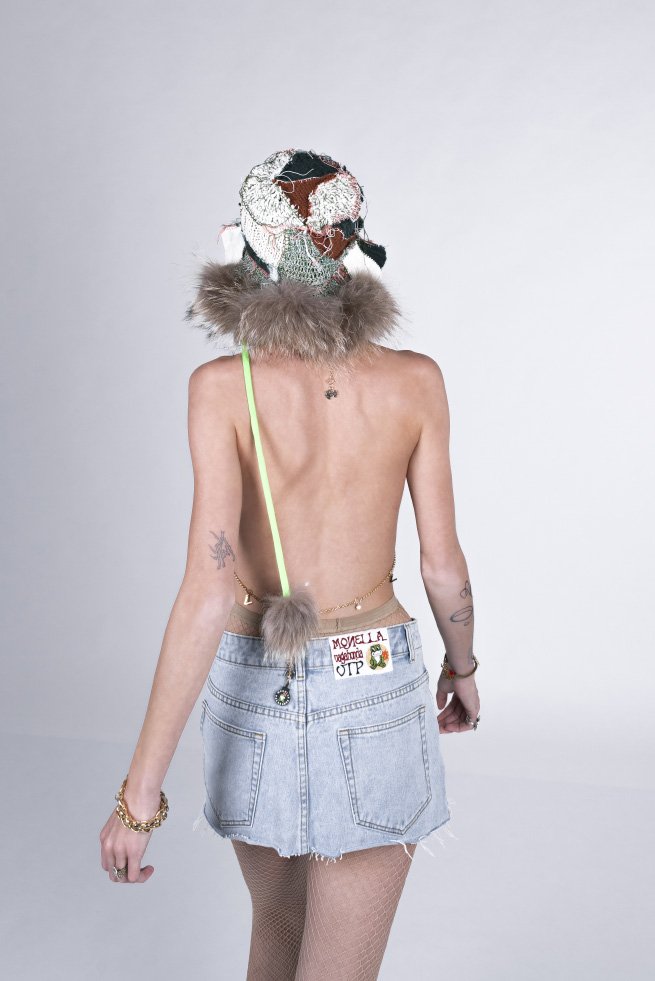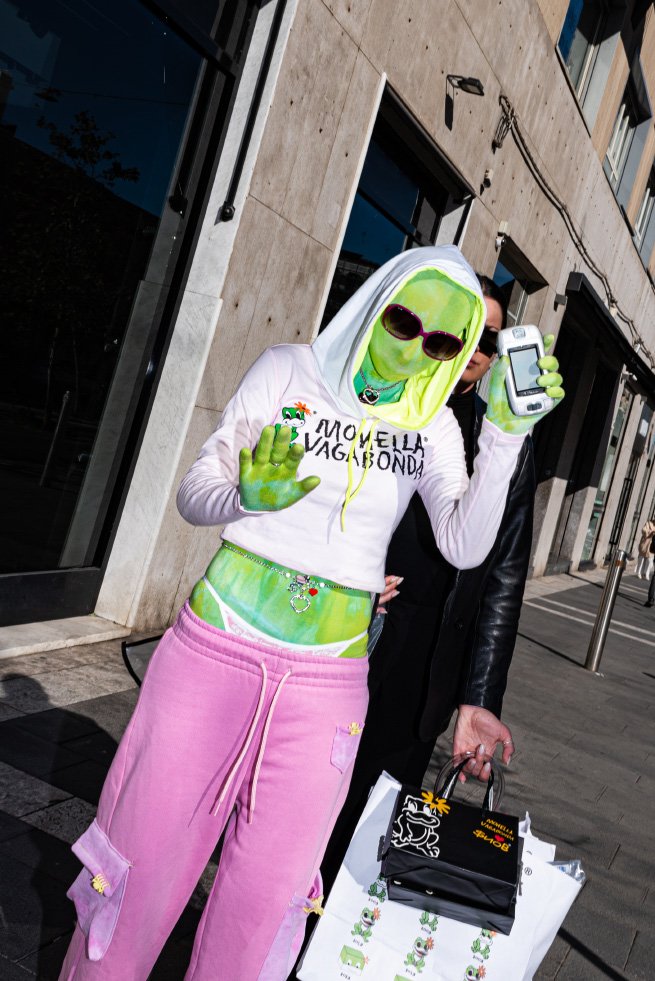Monella Vagabonda
If you grew up in the Italy of the 2000s, you certainly remember Monella Vagabonda. In those days, Italy was quite a controversial country to live in: it was all about VIP culture and branding yourself up. Monella Vagabonda embraced the Italian landscape of the time understanding what was creating hype in a period where trashy television and the star system of realities shows defined a whole generation of young people’s taste and ambitions.
But all this is now the iconic memory of a romanticised period, that somehow have left a tender trace in those who lived it but also in newer generations that are making an eulogy of bad taste, retrieving some distinctive elements from those years such as super low waist, cheap jewellery, rhinestones and tacky long nails, but in a way that is all gen-z.
To imagine a new direction for the brand was designer Mara Russo (@mara__russo), which started this project in early 2021, while graduating at IUAV, Venice, by taking the creative direction of the brand’s image and name thanks to the support of the founder Gorgoglione family and especially one of the sons, Ettore. Monella Vagabonda is now being re-launched with a collection all based on upcycling, conceptual sustainability and heritage innovation.
At the beginning of Monella Vagabonda, it was all in the name: meaning lit. “wandering brat” as a celebration of audacious, sexy and hyper-girly aesthetic - which of course was strongly biased and hetero-male-gaze-oriented but at the same time challenging the strong conservative reality of catholic Italy.
Thanks to the strategy of his founder, Gino Gorgoglione, the brand’s image became emblematic of an era where it was all about reality shows and star-system, everybody wanted to be famous and everything was about gossip.
Born in 2003 as a ready-to-wear brand made in Italy, they’ve achieved notoriety by basing their communication on iconic figures of Italian television wearing Monella’s clothes. All you needed by those years was jeans and a tee to make a statement. They reached out to all the “Monelle” making scandal in those days, such as showgirl Belen Rodriguez, singer Anna Tatangelo and porn actress Eva Hanger. In a strongly traditional country, libertine lifestyle was actually creating scandals, which were condemned but whose development was followed by all; this is because the new-born stars “were able to create a bridge between the new concept of 'vip' stardom and the dreams of ordinary people” says Russo.
Due to the arrival of large fast-fashion distribution chains but also the disruptive passage from television to social media and the precariousness of certain heteronormative systems of representation that the brand reinforced, after reaching maximum popularity in 2008, Monella starts its slow decadence which brought to the closure in 2016.
Monella Vagabonda contributed to built the identity of an entire generation, but is now being recovered by a total different mindset of young creators. It is not only about nostalgia: it is about retrieve a piece of costume history with different values and aims. Love for street fashion is enriched by a renewed consciousness on sustainability and identity issues. The shortcomings that caused the crisis were taken as a starting point to relaunch the brand. In Mara Russo’s own words: “continuing to put new goods into circulation seasonally, even through virtuous processes, is an alternative, but nevertheless a problematic way of feeding the capitalist market”.
Conceptual sustainability is not the usual greenwashing, but a new way of project making and creative process that here starts with the archive material as the place to rethink an existing brand’s image and adapt it to present times: “the Monella Vagabonda archive is full of evocative images when performed in a contemporary key” Russo states.
The re-launch of the brand was also led by the intervention of various guest artists such as Valentina De Zanche (aka LAMBY) @valentinadezanche, which as an illustrator gave a fresh look to Monella’s froggy logo, but also by -ness collective @ness_transghost which performed the old cloths archive as "a conscious self-denounce (towards) a brand that has based its success on the recognisability of the faces that wore it and by indulging in a controversial narrative of the female body and its social power”.
Infamously known and described by the contemporary fashion system as of bad taste and “tacky”, Monella Vagabonda is now making a bold statement towards its past, taking a whole new perspective on the ways of producing not just a product but an imagery that is conscious, fun, provocative and genderless. Monella Vagabonda reborn “as an act of resistance to a past that exists and echoes in the hearts of all of us”.
words FEDERICA NICASTRO
What to read next







































